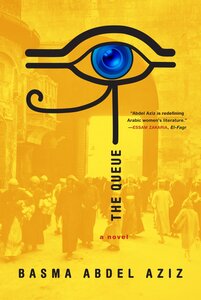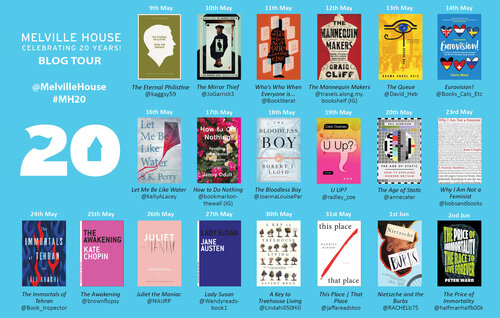This year is the 20th anniversary of the publisher Melville House. They publish an eclectic mix of fiction and non-fiction, including an extensive classics range, and I’ve always found their books intriguing. I was invited to review one of their titles for this blog tour, so I thought I’d revisit one of my favourite Melville House books: The Queue by Basma Abdel Aziz (translated from Arabic by Elisabeth Jaquette). Abdel Aziz is an Egyptian writer, artist and psychiatrist; The Queue is a sharp tale of authoritarianism.
Following an uprising, a mysterious structure, the Main Gate of the Northern Building – or just ‘the Gate’ – appears in a Middle Eastern city. Large and windowless, it dominates the surrounding physical space; but that’s nothing compared to the effect it soon has on people’s lives. The Gate begins to issue all manner of decrees: ‘before long, it controlled absolutely everything, and made all procedures, paperwork, authorizations, and permits – even those for eating and drinking – subject to its control.’
Then there’s a revolt against the Gate; but this one fails, and the Gate closes its doors. People are forced to queue – for hours, days, longer. Life as it was grinds to a halt:
No one knew when rush hour was anymore; there were no set working hours, no schedules or routines. Students left school at all sorts of times, daily rumors determined when employees headed home, and many people had chosen to abandon their work completely and camp out at the Gate, hoping they might be able to take care of their paperwork that had been delayed there. The new decrees and regulations spared no one.
Society reorients itself around the queue, to the point that little side businesses spring up providing refreshments, telephone calls, or other services to queuers. The novel’s deadpan tone serves to highlight the fundamental absurdity of this situation, as in (for example) a scene where people at different points of the queue start to argue over its length; and it takes a surveyor calculating the actual distance to stop the groups coming to blows over what might seem such a trivial thing. But this is a measure of how much the queue has distorted life, that it becomes so central to individuals’ preoccupations. There are also those with ulterior motives, waiting to take advantage of the queuers’ predicament: a company named Violet Telecom offers free handsets and calls to people in the queue, but it becomes apparent that their calls are being recorded and transmitted elsewhere.
Alongside the broader story of the queue, Abdel Aziz focuses in on a number of individual characters. Perhaps the central of these is Yehya, who was wounded in the ‘Disgraceful Events’ (as that uprising against the Gate became known) and still has a bullet lodged inside him. He’d like to have it removed, but that requires a permit (bullets being official property, you understand). But the authorities would rather that Yehya’s injury never happened; so his X-ray goes missing, his medical records are censored… and the people around him will find out what happens to those who try to interfere. The Queue is a novel that chills by appearing quiet and abstract, but underneath is an urgent precision.
This post is adapted from my original review of The Queue on Shiny New Books.


14th May 2022 at 5:11 pm
Great choice for the 20th anniversary, David! I read this one when it first came out and thought it was marvellous – so clever!